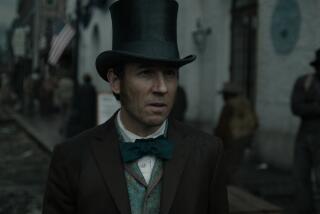Historic Lessons for a Terrorist Tribunal
WASHINGTON — Less than three months after an assassin shot Abraham Lincoln, a military tribunal sentenced three men and one woman to death by hanging and put four other defendants behind bars.
Their 1865 trial before nine senior Army officers is one of several historic precedents relied on by the Bush administration as it considers prosecuting 21st century terrorists before a military commission rather than a federal court.
The death sentences in the Lincoln conspiracy trial were carried out in a heavily guarded prison courtyard at 1:21 p.m. on July 7, 1865, just one day after the defendants learned of them.
Frantic bids for presidential clemency were rejected, even in the case of Mary Surratt, the boarding house owner who became the first woman executed by the federal government.
Most of the objections now being raised to the use of military tribunals rather than civilian courts also were registered 136 years ago.
“Such a trial is not only unlawful, but it is a gross blunder in policy,” said former Atty. Gen. Edward Bates. “If the offenders [are sentenced] to death by that tribunal, however truly guilty, they will pass for martyrs with half the world.”
In New York, attorney George Templeton Strong noted with approval the vigorous opposition of the city’s newspapers to the use of a military court.
“There may be reasons for the course adopted of which we know nothing, but it seems impolitic, and of doubtful legality,” Strong wrote in his diary.
The trial and the fate of the accused are recounted in a new and handsomely illustrated book, “Lincoln’s Assassins: Their Trial and Execution,” by James L. Swanson and Daniel R. Weinberg.
The authors note that Atty. Gen. James Speed concluded a military trial was fully warranted, reasoning that the assassination of the commander in chief and the attempted murder of Secretary of State William Seward were acts of war committed during an armed rebellion against the lawful government.
One senior officer contended years later that a disciplined military court was the better alternative because the public was so inflamed by Lincoln’s murder that asking private citizens to serve on a jury would have thrown the accused “to the mercies of an angry and revengeful mob.”
John Wilkes Booth shot Lincoln at Ford’s Theatre on the evening of April 14, 1865. Booth was already dead, mortally wounded by his pursuers, when the trial of his alleged conspirators opened on May 9 at the Old Arsenal Prison.
Over the next seven weeks the panel of Army generals and colonels heard 361 witnesses and produced a 4,900-page transcript.
But many thought the procedure was badly flawed.
Defense attorneys had no time for pretrial preparation or consultation with their clients who, when they were not in court, were held in solitary confinement, their legs and hands shackled and their heads covered with canvas hoods.
The defense lawyers, Swanson writes, “had insufficient time to locate, prepare and call the witnesses they wished and little time to investigate the government’s witnesses.”
Years later, Lt. Col. Richard A. Watts, a lawyer who had observed the trial, concluded: “This tribunal was a law unto itself.”
History has concluded that three of the executed defendants were guilty as charged: Lewis Powell, who tried to kill Seward; David Herrold, who accompanied Booth on his flight from Washington; and George Atzerodt, who flunked his assignment to kill Vice President Andrew Johnson but told no one of the plot to murder Lincoln.
But debate has never ended over the fates of Mrs. Surratt, who kept the boarding house where the conspiracy was discussed, and Dr. Samuel Mudd, the Maryland country doctor who set Booth’s broken leg after the assassination and was sentenced to life in prison.
Some hostile 19th-century observers called Mrs. Surratt’s execution “judicial murder.” They noted that President Johnson, Lincoln’s successor, ignored a recommendation for clemency from a majority of the military judges.
Mudd and the other living Lincoln conspirators were pardoned at the end of Johnson’s term in 1869.
Mudd’s ancestors have struggled ever since to clear his name by getting the conviction overturned.
That has stirred a reaction by people determined to prove Mudd’s guilt once and for all, an effort made clear in the title of a recent book on the issue: “His Name is Still Mudd.”
More to Read
Sign up for Essential California
The most important California stories and recommendations in your inbox every morning.
You may occasionally receive promotional content from the Los Angeles Times.










